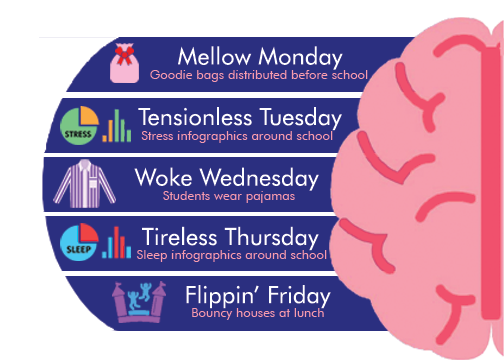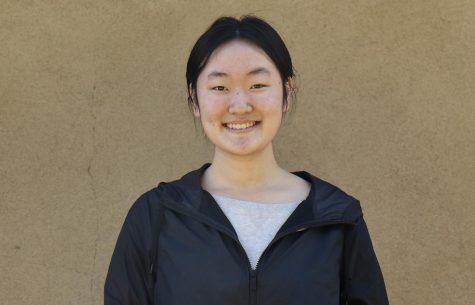Students enjoy de-stress fest and mental health carnival

May 3, 2019
As warm sunlight slants in through the windows of a library study room during lunch, students filter in from all corners of the campus. ASB, Aletheia and members from other clubs take a seat and begin an open conversation on stress, academic bullying and the stigma surrounding mental health, three issues deeply tied to Lynbrook. As the meeting wraps up, many students sharpen their focus on their respective projects related to mental health, with a new perspective in mind.
From April 22 to 26, students enjoyed a de-stress fest week organized by Lynbrook ASB’s Community Link commission.
“I think it’s great to relax and have a good time especially since Lynbrook is usually so competitive and stressful,” said sophomore Aditya Manikonda.
On April 22, students arrived early to receive goodie bags stuffed with tea bags, handwarmers, lotion and squishy stress balls. These items encouraged students to practice self-care. Some students wore their pajamas to school for a casual, relaxing Wednesday while music played in the temporary quad on the basketball courts. Infographics were posted around the campus on April 25, displaying important information and statistics about stress, sleep and mental health. At the end of the week, bouncy houses sprang up in the quad, many students could not resist jumping in with their friends.
The de-stress fest was a careful combination of relaxation with excitement. The main purpose of the week was to reduce the levels of stress and anxiety, though certain parts of the week were also designed to shine more light on mental health, a topic that is usually unintentionally overlooked.
“There is some neglection [of mental health],” said senior and IDC representative Amrit Ranjan. “Hopefully our de-stress week at Lynbrook and the intradistrict event will draw some attention to the problem to try to fix that.”
On the same week, the FUHSD Intra-District Council (IDC) also organized the Wellness Week Carnival, to bring more attention to mental health. Hosted at Homestead High School, this event was a collaboration between all five FUHSD schools, the Cupertino Teen Commission and the Youth Public Policy Institute (YPPI). Like Lynbrook’s de-stress week, the carnival consisted of activities planned to help students relax and de-stress. Students played games such as giant Jenga and even pedaled on smoothie bikes to blend their own drinks. In an arts and crafts corner, some dabbled with calligraphy and made batches of slime. The National Alliance on Mental Health (NAMI) also set up an informational booth about mental health at the carnival.
To better address the issue of mental health, FUHSD IDC chose to work with the Cupertino Teen Commission and YPPI, which both had experience working with NAMI and planning projects relating to mental health. Collaborating with the outside groups helped the FUHSD schools gain more insight and guidance on the sensitive topic. Mental health is often difficult to talk about, and both ASB Community Link and IDC tried to navigate this problem when planning their respective projects.
“I think mental health is a touchy subject, especially for those who suffer from it and are afraid to say so,” said junior Andy Li, Community Link commissioner and co-leader of the de-stress week. “[Mental health illnesses] should be considered as seriously as any other illness out there. It’s typically disregarded by people.”
Ensuring that Lynbrook students are more comfortable having conversations about mental health, and have a better understanding of the severity of mental illnesses and the resources available to them was a goal IDC and Community Link discussed in meetings organized by Activities Assistant Principal Brooke Chan. Two meetings have already occurred in February and March, and another is planned to be held in May. The meetings were open to all students interested in the subject or thinking of implementing projects related to mental health. Chan invited school psychologist Dr. Brittany Stevens and school therapist Dawn Bridges to help the students identify specific issues in the large realm of mental health.
“Obviously, [Stevens and Bridges] have spent a lot of time talking to high schoolers,” said junior and IDC Representative Aneesha Nema. “So, they were really helpful in bringing to our attention to what we should try to target. They know the issues that have been constantly brought up by high school students. That was useful for us.”
At Lynbrook, students are no strangers to struggles with mental health or stress. While the two are not always linked, excessive stress is harmful. Intense competition, advanced courses and heavy loads of extracurricular activities have become a part of Lynbrook’s culture. Competition causes students to compare themselves with their peers, which may lead to feelings of inferiority and unworthiness. Managing time with difficult schoolwork and other commitments can also put students under immense pressure. Not being able to manage their time properly only perpetuates a cycle of more sleep-deprivation and stress, which may spiral into problems with mental health or exacerbate mental health conditions.
Stress and competition can be harmful. However, Lynbrook is working to not normalize them or permit it to define the school or students. The de-stress week and Wellness Week Carnival may not drastically lower the levels of stress at Lynbrook in the long run, but both are significant reminders that a healthy balance between school, extracurriculars and downtime is necessary.
“We don’t always have to be so stressful and competitive,” Li said. “We should strive to do what’s best for us.”
De-stress week and Wellness Week Carnival help steer Lynbrook students in the right direction. Undeniably, there are expectations placed on Lynbrook students by themselves and others, but their most important responsibility is to make the right decisions for their own health and well-being.



























































